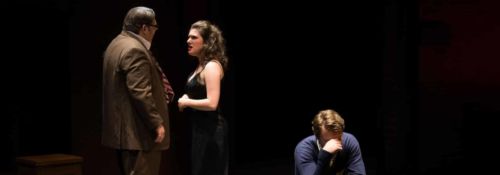
Theatre Needs to Make Us Uncomfortable
Written by Giannina Imperial
At Hillsdale, “edgy” is a word rarely used to describe day-to-day campus life. In Markel Auditorium, however, edgy is a refreshing change of pace from the norm.
In the thirty-plus years that Professor George Angell has been head of the Theatre Department, he and his colleagues have been presenting high-quality plays of all types: comedic, dramatic, heart-wrenching, and head-turning. Students of all majors come and audition, and those who make the cut bring new life to each play with their matureness of acting and emotion-filled portrayal of their characters.
But even among the numerous plays presented that make us laugh and cry, there are others that make us noticeably uncomfortable, addressing issues and narratives that we either disagree with or find too serious for a college performance. This can create a double-standard in the liberal arts, if we allow it to.
“Nobody will tell you that you can’t read works like The Miller’s Tale from Chaucer,” Professor Angell said. “In fact, we will devote whole classes to these works. But when it becomes something that is being done in an entertainment form, people tend to be more sensitive to it.” He went on to quote Marshall McLuhan, a central figure in the 1900s in media discourse, by saying, “Medium is the message.” McLuhan, he said, argues that how the intended message of a work is transmitted is at least as important as the message itself.
Theatre is powerful because it causes us to see real people participate in real and emotional dialogue and to watch the actors’ facial expressions twist and turn in anguish, laughter, love, or hate. We encounter a play’s intended message more intimately when we see contentious ideas in the context of real and tangible people. Thus, spectators are more likely to walk away from performances when faced with ideals that do not align with theirs because they are forced to encounter different opinions more personally.
Hillsdale offers its students opportunities to encounter those other ideals, and many choose to embrace them and to have those conversations that create deeper understanding from a controversial work. The theatre in a liberal arts education is not only a place of entertainment but a place to further our pursuit of the higher things. In our inevitable discomfort, we are forced to think deeply about what we believe, why we believe it, and why others believe what we may not. So the theatre is a welcome experience, and neither its controversial content nor the conversations that arise from it should be stifled.
“Theatre is a reflection of the society we live in, but because it is portrayed with live actors on a stage, chances are you are going to make some people very uncomfortable,” Professor Angell said. “Should we regulate what is shown to people, or should we allow people to make their own choices and to inform those choices? These are questions that have been asked since Renaissance Italy, and are still relevant today.”
 Giannina Imperial, ’18, is a psychology major and biology minor from Jackson, MI. If she isn’t in the Psychology Suite running research participants or in AJ’s immersed in her biology textbooks, you’ll find her in the music hall for one of the dozen rehearsals she’ll have that day. She loves God, neuroscience, dancing like no one’s watching, getting ice cream with friends, and trying out every Filipino recipe in her mother’s arsenal of cookbooks.
Giannina Imperial, ’18, is a psychology major and biology minor from Jackson, MI. If she isn’t in the Psychology Suite running research participants or in AJ’s immersed in her biology textbooks, you’ll find her in the music hall for one of the dozen rehearsals she’ll have that day. She loves God, neuroscience, dancing like no one’s watching, getting ice cream with friends, and trying out every Filipino recipe in her mother’s arsenal of cookbooks.
Published in November 2018